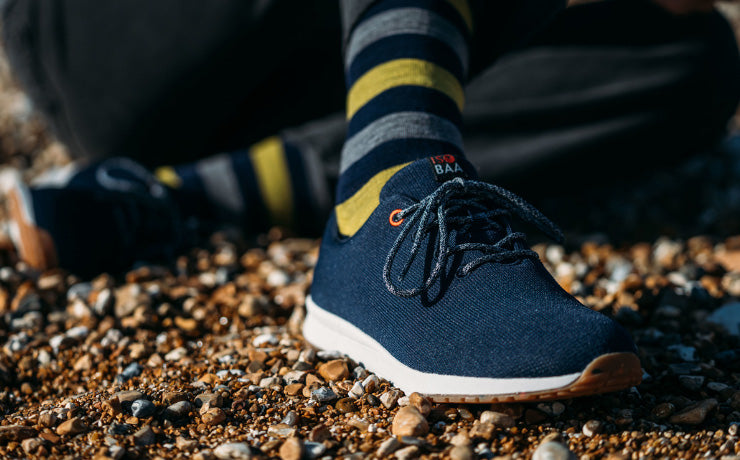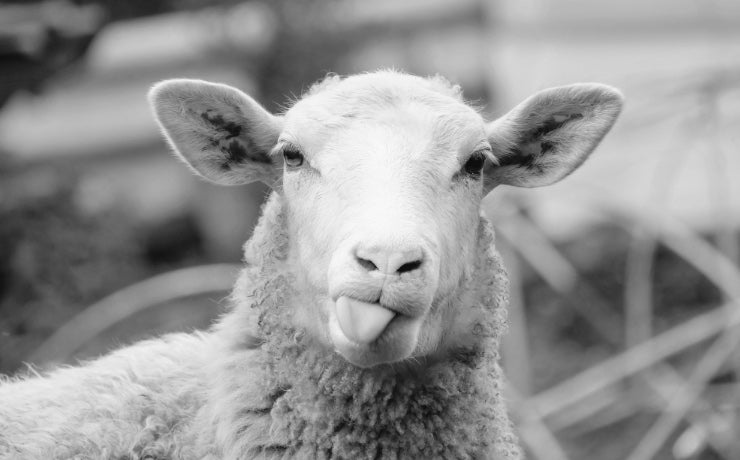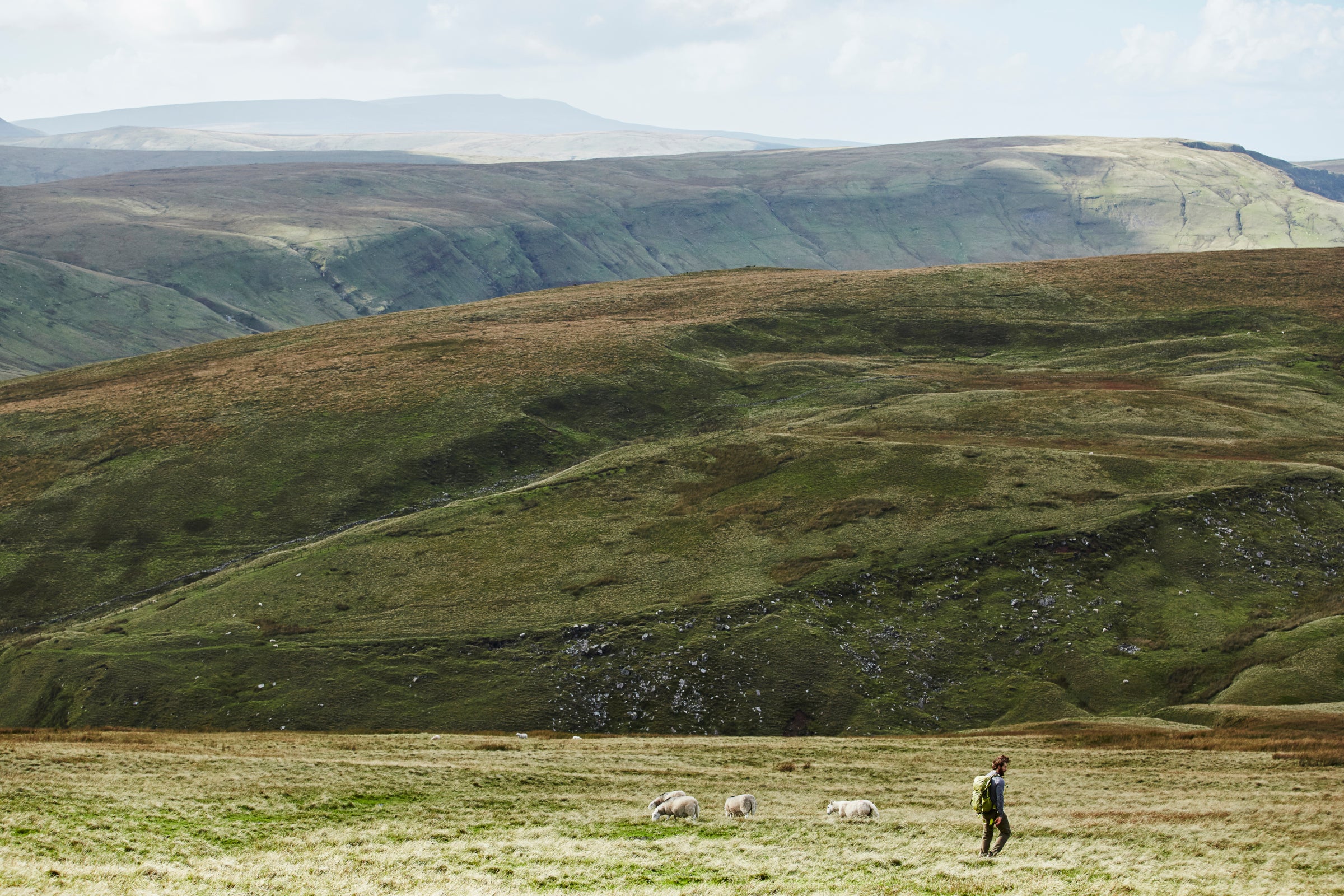Merino Wool: Nature's Performance Powerhouse
This amazing fiber comes from Merino sheep, known for their incredibly soft coats. Think of it as nature's ultimate performance fabric.
Merino sheep originated in Spain but today, most Merino wool comes from Australia and New Zealand. These countries are known for their lush grasslands and commitment to raising happy, healthy sheep.
We source our merino wool from our trusted Australian supplier with a heritage that dates back to 1857, who prioritise animal welfare and sustainable practices.
What makes it so great
Cloud-like softness
Its fibers are super-fine, making it incredibly smooth against your skin.
Outsmarts the elements
Keeps you warm when it's cold and cool when it's hot.
Stink? Never heard of it
Naturally resists the buildup of odour-causing bacteria.
And there's so much more
Understanding Merino Wool Weights
Merino wool garments come in different weights, measured by GSM (grams per square meter). GSM indicates the fabric's density, directly impacting warmth, breathability, and the overall feel. A higher GSM generally means a warmer, slightly heavier garment, while lower GSMs are lighter and more breathable. Understanding GSM helps you select the perfect merino piece for your activity and the weather conditions you expect.
Ultralight
150 - 180 gsm
Moisture Wicking
Breathability
Durability
Temperature range: Warm weather
Best Uses: Base layers, summer hiking, travel
Lightweight
180 - 200 gsm
Moisture Wicking
Breathability
Durability
Temperature range: Cool to moderate temperatures
Best Uses: Base layers, year-round hiking, activewear
Midweight
200 - 260 gsm
Moisture Wicking
Breathability
Durability
Temperature range: Cold to moderate temperatures
Best Uses: All-around layers, hiking, winter activities
Heavyweight
260 - 320 gsm
Moisture Wicking
Breathability
Durability
Temperature range: Very cold temperatures
Best Uses: Extreme cold base layers, winter expeditions
Ultra Heavyweight
320+ gsm
Moisture Wicking
Breathability
Durability
Temperature range: Extreme cold
Best Uses: Specialised cold-weather gear
Merino Wool FAQs
Merino wool comes from Merino sheep, a breed known for its incredibly fine, soft fibers. Regular wool can often feel itchy, but Merino is exceptionally comfortable against the skin.
Yes! Merino wool is a fantastic insulator. Its fibers trap air, creating a cosy layer of warmth without being bulky. It's great for layering in cold weather.
Definitely! Merino's natural breathability and moisture-wicking properties help keep you cool in warmer weather. It's a versatile fiber for year-round use.
Yes! Merino naturally resists the bacteria that cause odours, so you can wear it for multiple days without needing to wash it as frequently as other fabrics.
Merino is surprisingly easy to care for. Most garments are machine washable on a delicate cycle with cold water. Lay flat to dry to prevent shrinkage. More detailed information can be found on our product care page, and garment care labels.
Merino wool is a renewable resource – sheep grow new fleece every year! Many brands focus on ethical sourcing and ensuring the well-being of their sheep, and we are no exception.
No, Merino wool is renowned for being soft and non-itchy. The fibers are so fine that they bend easily, rather than creating the prickly sensation of traditional wool.
Merino wool can shrink if exposed to high heat. Make sure to follow the washing instructions on your garment carefully, generally using cold water and laying flat to dry.
Yes! While the fibers are fine, Merino wool is a surprisingly durable natural fabric. With proper care, your Merino garments can last for years.
Generally, yes. Merino wool is a natural fiber that's less likely to trigger allergies compared to synthetics or even some types of traditional wool.
There's more
Benefits of Merino Wool
-
Merino wool is a champion at keeping you comfortable in various temperatures. Its secret lies in its fiber's natural crimp. These crimps trap air, creating insulation to keep you warm in cold weather. When it's hot, merino wool wicks away moisture from your skin, which helps you stay cool and dry. This breathability allows merino wool to regulate your body temperature, making it a versatile fabric for all seasons.
-
Merino wool excels at moisture management. Unlike cotton that gets heavy and clammy with sweat, merino wool fibers absorb a surprising amount of moisture (up to 30% of their weight) without feeling wet. This keeps you dry and comfortable during activity. The moisture then wicks away from your skin to the garment's surface, where it can evaporate, leaving you feeling fresh.
-
Merino wool naturally resists odour because it manages moisture and traps odour molecules. The wool's ability to wick sweat away from your skin leaves less moisture for odour-causing bacteria to flourish. Additionally, the structure of merino wool fibers allows them to absorb and hold onto odour molecules, preventing them from being released into the air. This trapped odour is then released when the garment is washed.
-
Merino wool is renowned for its exceptional softness. This is because the fibers of merino sheep are incredibly fine, much finer than traditional wool. These fine fibers bend easily against your skin, eliminating the itchy, scratchy sensation often associated with other types of wool.
-
Merino wool breathes exceptionally well. Its thin fibers allow air to circulate freely, preventing you from feeling stuffy or overheated. This breathability complements merino wool's moisture-wicking ability, keeping you dry and comfortable during exercise or in warm weather.
-
Merino wool is eco-friendly because it's biodegradable. Unlike synthetic materials that can linger in landfills for centuries, merino wool decomposes naturally in a matter of months or years. This breakdown by microorganisms returns valuable nutrients back to the earth, making merino wool a sustainable clothing choice.
-
Merino wool packs a punch in warmth despite its surprising lightness. The fine fibers of merino trap air very efficiently, creating insulation without adding bulk or weight. This makes merino wool garments ideal for layering, allowing you to stay warm without feeling weighed down. Additionally, the lightweight nature of merino wool makes it comfortable to wear during all seasons.
-
Many merino wool items, though not all, are conveniently machine washable. This adds to their easy care routine, saving you time and effort compared to hand-washing. Look for garments labeled "machine washable" and follow the care instructions for optimal results. Remember to use a gentle cycle with cold water and a wool-safe detergent to maintain the quality of your merino wool clothing.
-
Merino wool shines as a natural fiber for several reasons. Unlike synthetic materials derived from petroleum, merino wool is a renewable resource that comes from sheep. It's also comfortable to wear next to skin because it allows your body to breathe and regulates temperature naturally. Additionally, merino wool is often biodegradable and can decompose back into the earth, making it a more eco-friendly clothing choice.
-
Merino wool ditches the itch factor thanks to its incredibly fine fibers. Regular wool has thicker, coarser fibers that can poke and irritate your skin. In contrast, merino wool fibers are much thinner, around 17-21 microns in diameter (think: a human hair is about 70 microns). These finer fibers bend easily against your skin, feeling luxuriously soft instead of scratchy.
-
Merino wool earns a bonus point for being ethically sourced through "Non-mulesed" practices. Mulesing is a controversial procedure where skin is removed from sheep to reduce the risk of flystrike (fly infestation). Merino wool labeled "non-mulesed" ensures the sheep weren't subjected to this painful practice, promoting animal welfare.
-
Merino wool dries relatively quickly, especially for a natural fiber. While not quite as fast-drying as some synthetics, merino excels at wicking away moisture from your skin. This moisture then spreads throughout the garment's fibers, maximising surface area for evaporation. This allows merino wool to dry faster than cotton and keeps you feeling fresh, even after sweating.
-
Merino wool is a renewable resource because sheep grow a new fleece every year. This means you can enjoy the benefits of merino wool clothing without depleting a finite resource. It's a sustainable choice compared to synthetic materials that rely on non-renewable resources like fossil fuels.
-
Merino wool boasts a surprising amount of natural stretch. This benefit comes from the unique structure of its fibers. Merino wool has a natural crimp, like a microscopic spring. This crimp allows the fibers to flex and rebound, giving merino wool garments a comfortable stretch that moves with you. This stretchy quality also helps clothes retain their shape over time, minimising wrinkles and bagging.
-
Merino wool is naturally wrinkle-resistant due to its elasticity and fiber structure. The same crimp that gives merino wool stretch also helps it bounce back from wrinkles. These crimps act like tiny springs that hold the fibers in place, preventing them from folding and creating wrinkles. This makes merino wool a great travel companion and a low-maintenance fabric that requires minimal ironing.












